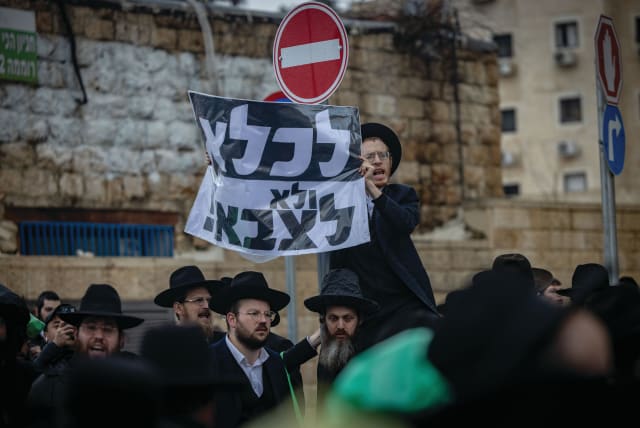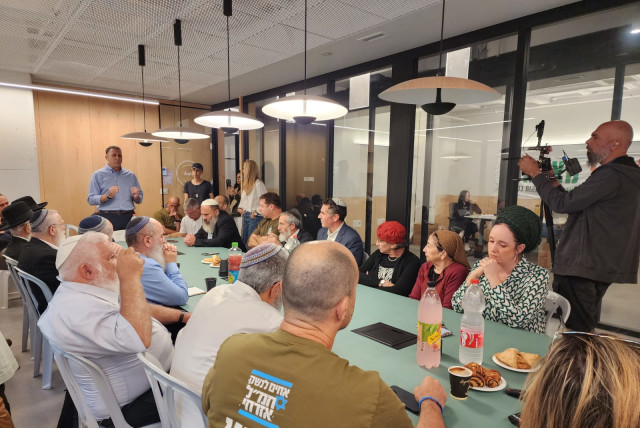Religious Zionist rabbi: Campaign promoting haredi draft aims to oust Netanyahu gov't

The ‘Post’ speaks with two eminent religious Zionist rabbis on the fallout from the Chief Rabbi’s haredi draft law comments.
The religious-Zionist sector has suffered terrible losses in the Israel-Hamas war. Many fallen soldiers hailed from this sector, in which military service, particularly combat service, is often encouraged. Torah study is central for many but it is generally combined with service, employment, and Zionism.
This is perhaps why, for some in this sector, Sephardi Chief Rabbi Yitzhak Yosef’s remarks that haredim (ultra-Orthodox) “will all move abroad” if forced to join the IDF were deeply significant.
“Honorable rabbi, you need to ask forgiveness from my wife, from her tears, and to go to Mount Herzl and apologize to Amitay, a yeshiva student and a combat soldier,” Rabbi Tamir Granot responded to the chief rabbi’s remarks, referring to his son Capt. Amitay Zvi Granot, a commander in the 7th Armored Brigade who was killed near the Lebanon border in October.
“In the name of my wife’s tears, did Amitay make a mistake? Is he lying under the ground at Mount Herzl for nothing? Should he and all his friends who are lying there with him, and in other cemeteries around the country, have stayed in yeshiva and left the IDF and self-sacrifice to secular people? Or have gone abroad to study Torah?” he asked in a video response to the chief rabbi that was posted on the YouTube channel of the yeshiva Granot heads, Orot Shaul.
“The chief rabbi’s statement was an expression of something deeper that has been becoming clearer in the past few months,” Granot told The Jerusalem Post, explaining that in terms of our joint destiny, “it becomes clear that the people fighting shoulder to shoulder, ‘under the stretcher [sacrificing themselves for the greater good],’ are religious-Zionists and secular people.”
There is a change occurring in the consciousness of the religious-Zionist sector, according to Granot. “When we were young, we would do activities in Bnei Akiva [religious-Zionist youth movement], where we would talk about who you are closer to – secular people or haredim. Generally, at the end, we would talk about how important the Torah and mitzvot are and about how that is where our connection to the Land of Israel stems from, and so maybe we are closer to these things,” he explained.
“But as we are in an existential struggle, something in the heart is shifting,” he said. “There is a feeling of alienation and disappointment and frustration.”
This is not due to any lack of recognition of the wonderful things that exist in the haredi world, such as “Torah, love of Israel, and hessed [kindness],” he added, explaining that these feelings stem from the fact that even if you love your brother, when you are left alone with a practical mission, especially one in which “only your blood will spill,” the disappointment is bitter.
Every citizen should be trained to serve in a combat position
Granot says every citizen who reaches the age of 18 should be trained with at least the bare minimum needed to serve in a combat position.
“This won’t hurt Torah study,” said Granot, adding that it can be one month a year and take place during yeshiva vacations.
Granot sees a haredi draft as a real opportunity for partnership between the haredi and other sectors but says that this will require effort from outside of the haredi sector as well.
“If you want to change another society, you must not attack them,” he said. “You must understand and respect them, it is better to love them. But you must at least understand and respect them,” he said.
It is not possible to make change “if you come to the haredi world from the perspective of ‘you are not equal, you are lazy, you are leeches,’ if you don’t understand their values and fears,” explained Granot.
A haredi draft will require more than respect and understanding according to Granot. The IDF must offer haredim service options that take ultra-Orthodox values into account, even if this sometimes clashes with other, more liberal values. “If you want everything, you lose everything,” said Granot.
In his YouTube response, Granot also addressed some of the political discourse surrounding the rabbi’s words. Noting that some politicians are using the remarks for political gain, Granot added that “the truth stays the truth when [opposition head Yesh Atid leader Yair] Lapid and [Yisrael Beytenu chairman Avigdor] Liberman say it. The Torah stays the Torah when Lapid and Liberman say it. If Lapid and Liberman said to keep Shabbat, would you violate Shabbat to not do what they said?”
The situation is bad, said Granot, who added that it is also a chance for change.
“This crisis can bring forth a great change in the relationship between the Torah and the people of Israel. Am Yisrael can be closer to the Torah, and bnei hatorah [scholars] can be much closer to Am Yisrael,” he concluded.
Rabbi Yigal Levinstein, one of the founders and co-directors of Bnei David, the prominent religious-Zionist pre-military academy in the settlement of Eli, had a different reaction to the chief rabbi’s remarks.
Levinstein told the Post that the meaning of the chief rabbi’s words should not be taken at simple face value, and contain a deeper meaning.
“He was just trying to emphasize the severity of the situation,” said Levinstein, explaining that the chief rabbi is part of the school of thought that says that those studying Torah are halachically exempt from army service.
“He thinks that they are a critical spiritual shield and that their prayer is pikuach nefesh [the principle that saving human lives takes precedence over everything else]. In his view the army is dependent on this Torah study,” said Levinstein.
“The rabbi thinks that this is a very big responsibility, and [when he said that they would go abroad rather than be drafted] he is saying ‘we will not agree for any price in the world to have them stop studying Torah.’ He wanted to demonstrate the severity of the matter. It is just about the severity of a forceful draft and nothing more.
“No one is going anywhere,” added Levinstein, saying that he predicts the yeshivot will continue to grow.
“We don’t need to get excited about everything,” he said, adding that the discussion surrounding the statement wasn’t real or honest. “The public for whom the lesson was intended understands the context in which the statement was made.”
Those who want to delegitimize the Torah world are making an active attempt to do so by taking the chief rabbi’s words out of context, Levinstein added, saying that they will often watch his speeches and lessons specifically to do this.
“That infuriates me,” he said. “That shows that nothing has changed since October 7.
“I thought that this was the biggest lesson from the October 7 massacre,” said Levinstein. “This disaster mandates soul-searching, and language is a critical tool in our discussions and ability to live together even if we don’t think the same things. We don’t need to encourage hatred and delegitimize those who think differently.”
Levinstein also touched on the political side of the discussion surrounding the chief rabbi’s words. Focus on the statement is part of a long tradition of using, or abusing, haredim for political clout, according to Levinstein.
“This jumping on haredim is not because they really want them to draft, there is a different political reason every time,” he said.
This time, the attack on haredim is part of an attempt to bring down the current government and Prime Minister Benjamin Netanyahu, according to Levinstein. “Will the haredim draft if this government falls?” asked Levinstein, saying that the idea that this would happen is foolish.
“To have a haredi draft you need to create the conditions that allow them to serve,” said Levinstein, referencing specifically those haredim who are not invested in Torah study and are interested in drafting to the IDF, but concerned about losing their haredi identity.
“To draft them, you need to allow them to maintain their identity, which requires far-reaching changes in the IDF,” he said.When asked if he thinks the current security situation in Israel means that the haredim are needed in the IDF and Israel’s defense bodies, Levinstein said it isn’t relevant because “in life, you must be practical.
“Something can be critical, but that doesn’t make it possible. Being in galut [exile] was a disaster, and the Jewish people needed to be in Jerusalem, but how long did it take to make that happen? 2,000 years?” he offered as a parallel.
Whether or not Israel really needs to draft the haredim does not matter because for the draft to be possible there must be a desire and a willingness both from the haredim and from the IDF, Levinstein explained.
“That is the real equation for drafting haredim – desire and willingness,” he said . “Whether or not it is needed doesn’t matter. There are haredim who want to draft and people in the army who want them to, but the conditions now don’t allow it.”
A possible workaround to dealing with widespread change in the IDF could be designing a national guard to fit the haredi lifestyle, Levinstein suggested. Israel’s national guard has been talked about for years and will need thousands of people, explained Levinstein. “Since it will be built from scratch, it could be built to fit a haredi way of life,” he suggested.
Whether or not the chief rabbi’s words are a watershed moment or the Israel-Hamas war brings the long controversial issue of the haredi draft to a true head and possible conclusion are not yet clear.
For some this appears to be political business as usual, while for others the cracks between Israel’s sectors are beginning to fissure, bringing opportunity for solution or crisis. With two petitions on a haredi draft before the High Court, and the IDF calling to extend the service of those who serve to cover growing manpower needs, only time will tell if a true resolution is near.
Jerusalem Post Store
`; document.getElementById("linkPremium").innerHTML = cont; var divWithLink = document.getElementById("premium-link"); if (divWithLink !== null && divWithLink !== 'undefined') { divWithLink.style.border = "solid 1px #cb0f3e"; divWithLink.style.textAlign = "center"; divWithLink.style.marginBottom = "15px"; divWithLink.style.marginTop = "15px"; divWithLink.style.width = "100%"; divWithLink.style.backgroundColor = "#122952"; divWithLink.style.color = "#ffffff"; divWithLink.style.lineHeight = "1.5"; } } (function (v, i) { });

